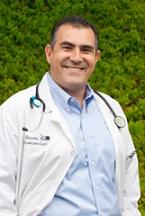 The last week of November is the 15th Annual GERD Awareness Week. Gilbert Simoni, MD, of Los Robles Hospital in Thousand Oaks, Calif., discusses gastroesophageal reflux disease and raising awareness.
The last week of November is the 15th Annual GERD Awareness Week. Gilbert Simoni, MD, of Los Robles Hospital in Thousand Oaks, Calif., discusses gastroesophageal reflux disease and raising awareness. It is estimated at the very least 10 percent of adults have gastroesophageal reflux disease. There are even more people that are unaware that they have the condition. "The incidence of GERD has risen exponentially since the 1970s," says Gilbert Simoni, MD, a gastroenterologist with Los Robles Hospital in Thousand Oaks, Calif. The week of Thanksgiving marks the 15th Annual GERD Awareness Week.
Dr. Simoni addresses the keys to diagnosing and treating GERD before it leads to complications such as Barrett's esophagus or esophageal cancer, as well as actions physicians can take to increase awareness.
Diagnosis
GERD is typically associated with heartburn, but this is not the only manifestation of the disease. GERD patients may have a chronic cough, sinusitis and even dental erosion; 65 percent of GERD patients don't experience heartburn at all. Obesity has been associated with GERD, as a person gains weight pressure to the stomach increases and the risk of reflux rises. There are many theories as to why the occurrence of GERD has increased, but regardless of the reason it continues to do so.
Diagnostic tests for GERD include the PPI challenge, Bravo pH Monitoring Test and esophagram. "In my opinion the gold standard of diagnosis is an endoscopy. You can not only diagnose reflux itself, but also identify any complications such as Barrett's or ulcers," says Dr. Simoni.
Proton-pump inhibitors have become increasingly common and inexpensive for patients to buy over the counter, reducing the efficacy of the PPI challenge as a diagnostic tool. Bravo pH monitoring, while effective at measuring levels of acid coming out of the esophagus, will not help in the diagnosis of a patient with non-acid reflux. An esophagram, which involves the swallowing of barium, has not always proven to be a reliable tool for definitive GERD diagnosis. Therefore, impedance would be helpful to measure reflux of contents of the stomach, be it liquid or gas, acidic or non-acidic.
Treatment
Traditionally, medication has been the first line of treatment for GERD. "The first line of treatment used to be H2 blockers, which reduce acid by blocking certain receptors in the cell that produce acid, but with the advent of proton pump inhibitors we have been able to completely shut down the acid factories (Proton Pumps)," says Dr. Simoni. Though these medications greatly reduce acid, thereby minimizing the symptoms of GERD, they do not address the root cause.
The most common cause of GERD is a loose lower esophageal sphincter. For many years, the solution was open or laparoscopic Nissen fundoplication surgery. "It was scary for the GI physicians and patients going through it. There are long-term side effects and complications. It is an invasive procedure," says Dr. Simoni.
Over the past five years, Dr. Simoni has been performing Transoral Incisionless Fundoplication as a GERD treatment. After undergoing the TIF procedure, Dr. Simoni has seen reflux completely resolved in 90 percent of his patients. The procedure typically takes 40 minutes to complete, often being performed on an outpatient basis or requiring at most one night in the hospital.
A randomized, multicenter clinical trial comparing TIF with twice daily PPIs has shown promising results. "The data looks great so far," says Dr. Simoni. "It truly treats the disease and not just its symptoms."
Complications
GERD that goes untreated or undiagnosed puts patients at risk of developing Barrett's esophagus or esophageal cancer. Daily GERD can increase the risk of esophageal cancer by eight fold. In many cases, by the time esophageal cancer is diagnosed it has reached Stage 3 and the chance of a patient living six months past the diagnosis is low.
Though PPIs have proven effective as a first line treatment for GERD, the medications have been shown to increase risk of osteoporosis and infections such as C. difficile and reduce the ability to absorb vitamins and minerals.
Raising awareness
The Esophageal Cancer Action Network is a champion for increasing awareness of GERD, Barrett's Esophagus and esophageal cancer. Dr. Simoni serves as a professional partner of ECAN. The organization, in collaboration with physicians across the country, has developed a GERD, Barrett's esophagus and esophageal cancer screening guide for patients.
Raising awareness begins with familiarizing the public with the signs and symptoms and continues with community outreach. The ultimate goal of raising GERD awareness, and by extension Barrett's esophagus and esophageal cancer awareness, is to increase the number of people undergoing screening and to save lives. "This is a preventable cancer, just like colon cancer, and the first line of prevention for any cancer is screening," says Dr. Simoni.
More Articles on Gastroenterology:
6 Recent GI-Driven Center Openings
La Peer Health Systems Leads Fundraising Campaign for Esophageal Cancer Action Network
8 Things to Know From ACG 2013 Annual Meeting


